La Dame de Monsoreau
Read La Dame de Monsoreau Online
Authors: 1802-1870 Alexandre Dumas
Tags: #France -- History Henry III, 1574-1589 Fiction


This book made available by the Internet Archive.
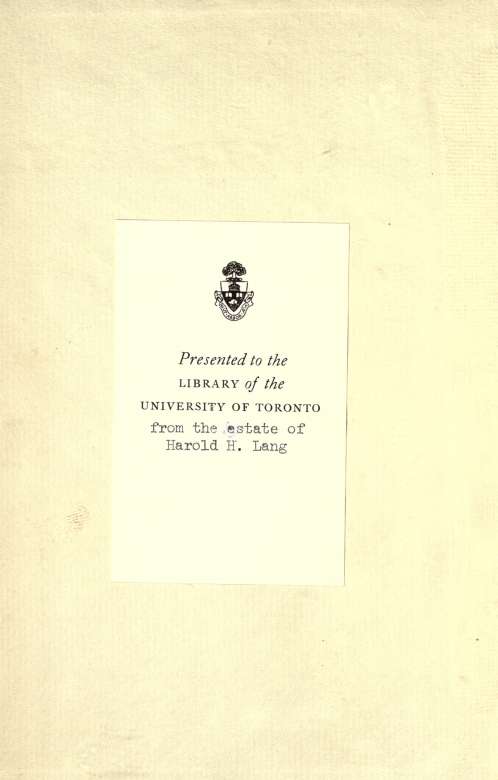

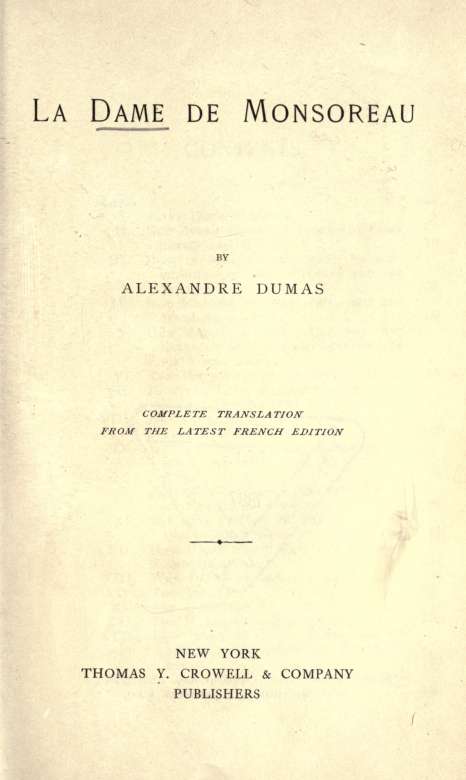
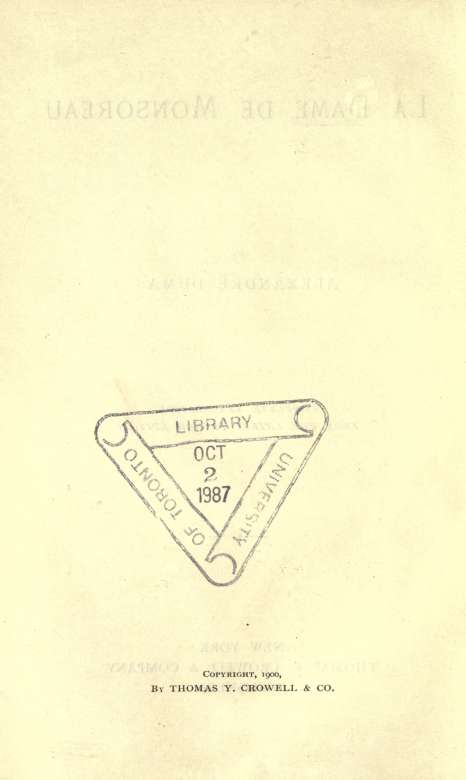
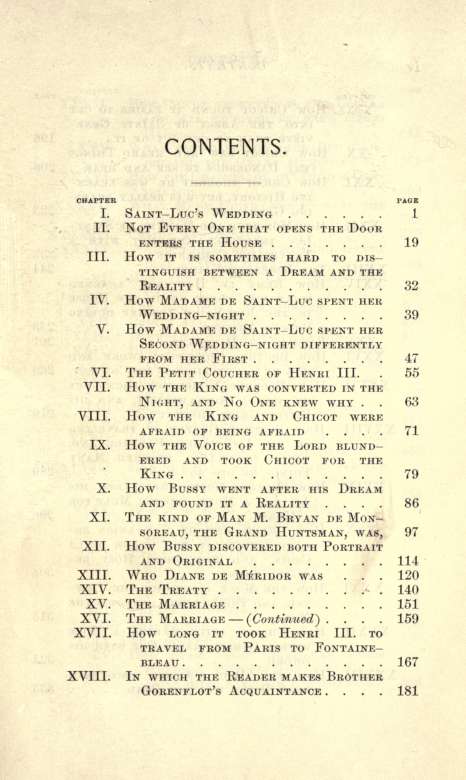
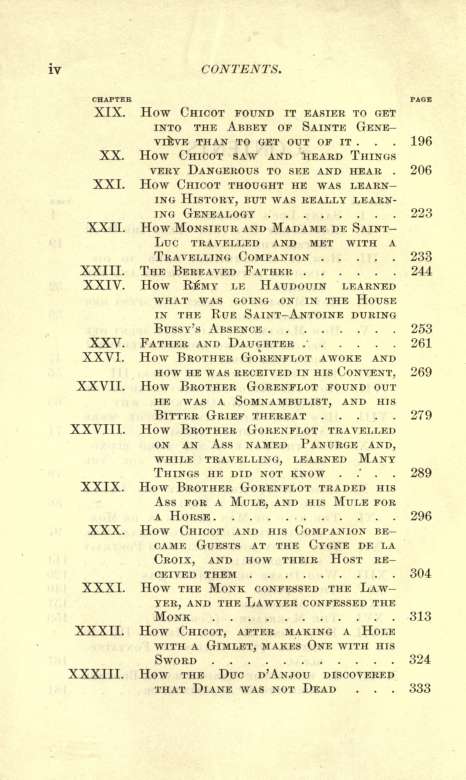
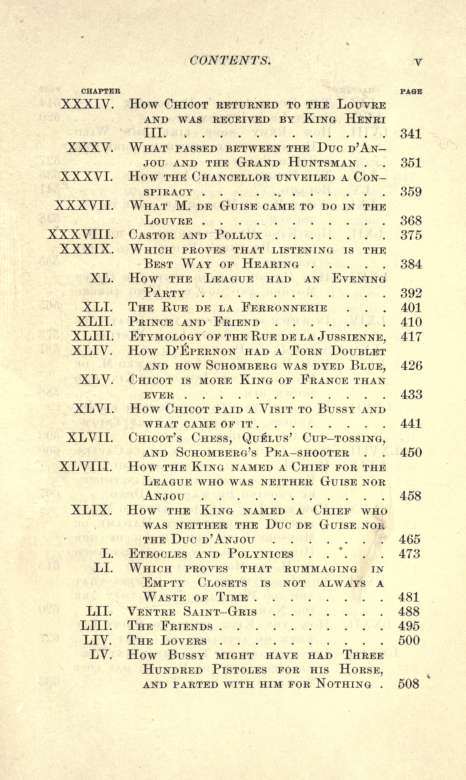
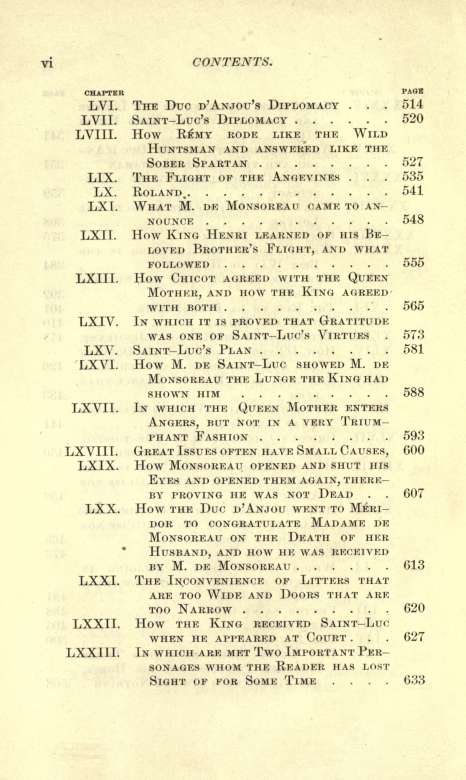
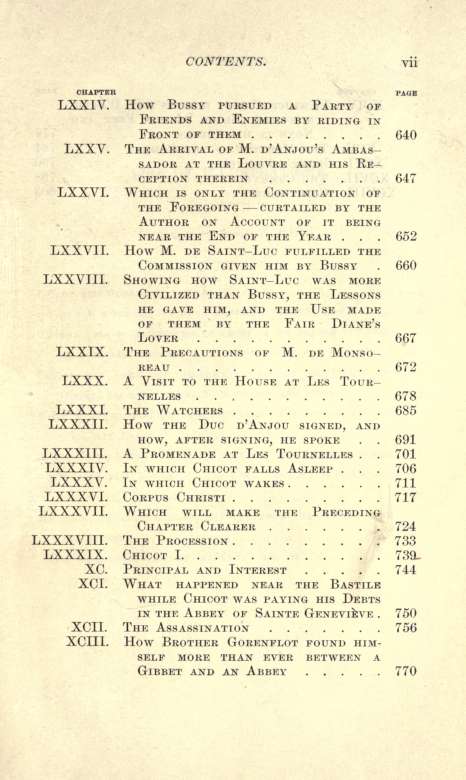
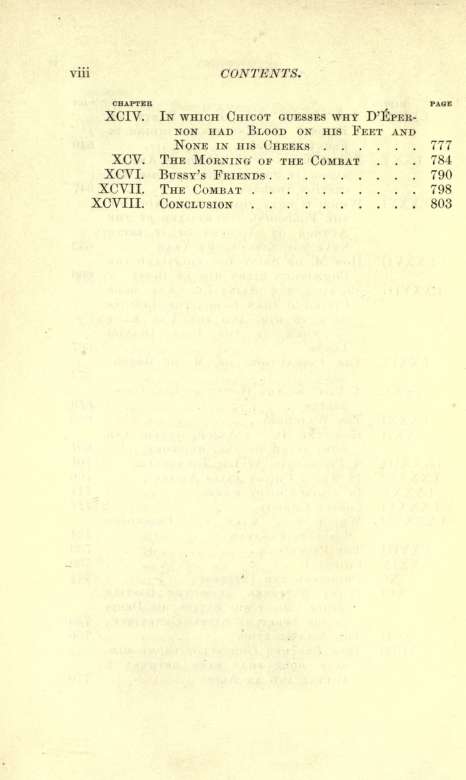
Drawings by Frank T. Merrill.
PAGE CHICOT AND GORENFLOT. (Page 191) Frontispiece
"YOU ARE WOUNDED, MY DEAR MONSIEUR, ARE YOU NOT?" 34
"I WAS ABLE TO DISTINGUISH IN FRONT OF HIS SADDLE THE FORM
OF A WOMAN, AND HIS HAND PRESSED OVER HER MOUTH "... 105 CHICOT RAN OVER THE PARCHMENT BROUGHT BY PlERRE DE
GONDY, HIS EYES SPARKLING WITH JOY AND PRIDE 330
UPON A LITTLE WOODEN BENCH BACKED AGAINST THE CHURCH
WALL SAT DIANE 421
A TERROR HE COULD NOT RESIST HELD FRANCOIS IN ITS CLUTCHES, 491 "I RESPECT YOU, MONSIEUR; YOU WERE HORRIBLY JEALOUS, BUT
YOU WERE A BRAVE MAN " 590
HE TOOK, OR RATHER, TORE, THE PEN FROM THE COUNT'S HAND
AND SIGNED 699
"• YOU WILL GET ME KILLED, MADAME," SAID HE 759
LA DAME DE MONSOREAU.
CHAPTER I. SAINT-LUC'S WEDDING.
AFTER the people's celebration of Shrove Sunday in the year 1578, just as the last murmurs of the joyous merry-making were dying away in the streets, a splendid festival was beginning in the magnificent hotel, lately built on the other side of the water, almost fronting the Louvre, by that illustrious House of Montmorency, which was allied to the royal house of France and regarded itself as on a level with princely families. The object of this private festival, which followed the public festival, was to celebrate the wedding of Franqois d'Epinay de Saint-Luc, the familiar friend and favorite of Henry III., with Jeanne de Cosse-Brissac, daughter of the French marshal of that name.
The banquet had taken place at the Louvre, and the King, who had consented to the marriage with the greatest reluctance, was present at the feast, but the harsh expression of his features was not at all in harmony with the occasion. His costume, too, was in keeping with his face : it was the dark maroon costume in which he is painted by Clouet at the wedding of Joyeuse, and his austere and majestic aspect, making him look like some royal spectre, struck every one with terror, especially the young bride, at whom he looked askance, whenever he did look at her.
And yet the sombre attitude of the King, in the midst of this fete, did not seem strange to the guests, for the cause of it was one of those court secrets along which courtiers glide with the greatest caution, knowing they are like those rocks that rise to the level of the sea and are fatal to the ships that touch them.
The banquet was hardly over before the King started up, and, of course, all the guests had to do the same, even those who acknowledged in a whisper their unwillingness to imitate the royal example.
Then. Saint-Luc, after gazing long and earnestly on liis wife's face, as if to draw courage from her eyes, approached the King.
" Sire/' said he, " will your Majesty deign to be present at the entertainment which I am giving this evening in your honor at the Hotel de Montmorency ?"
Henry III. had turned round with a mixture of annoyance and anger, and, after Saint-Luc's request, proffered in the softest and most imploring tone and in his most winning manner, he answered:
" Yes, monsieur, we will go, although you certainly do not deserve this token of friendship on our part."
Then Mademoiselle de Brissac, now Madame de Saint-Luc, had humbly thanked the King. But Henri had turned his back on her, without making any reply to her thanks.
" What has the King against you, M. de Saint-Luc ? " the wife had asked her husband.
" I will explain later on, my darling," said Saint-Luc, " when this angry mood of his has passed away."
" But will it pass ? " asked Jeanne.
" Most certainly it will," answered the young man.
Mademoiselle de Brissac had not been Madame de Saint-Luc long enough to insist on a definite reply: she put a strong restraint on her curiosity, but with the firm purpose of making Saint-Luc speak out when the moment would be favorable for forcing him to confess.
Henry III. was expected, then, at the Hotel de Montmorency just at the moment when the story we are about to relate to our readers opens. Now it was already eleven and the King had not yet arrived.
Saint-Luc had invited to this ball all whom the King, as well as himself, reckoned as friends; he had included in his invitations the princes and princes' favorites, especially those of our old acquaintance, the Due d'Alenqon, who had become the Due d'Anjou on the accession of Henri III. to the throne ; but, as the Due d'Anjou had not been present at the banquet in the Louvre, it did not seem likely, either, that he would make his appearance at the fete in the Hotel de Montmorency.
As for the King and Queen of Navarre, they had escaped, as we have related in a former work, into Navarre, and were now making open w r ar on the King at the head of the Huguenots.
The Due d'Anjou was also making a kind of war on him,
a war dark and underhand, a war in which he always took good care to keep in the background, thrusting to the front such of his friends as had not been cured by the fate of La Mole and Coconnas, whose terrible death can hardly have been yet forgotten by our readers.
As a matter of course, his gentlemen and those of the King lived on the worst possible terms, and there were, at least twice or thrice a month, hostile encounters between them, which seldom passed without some one of the combatants being killed or grievously wounded.
As for Catherine, she was at the height of her wishes : her best-beloved son was on that throne on which she had been so anxious to see him seated, for her own sake as well as for his ; and she reigned through him, while apparently caring nothing for the things of this world and anxious only about her salvation.
Saint-Luc, although becoming terribly uneasy when he saw that no member of the royal family showed any sign of appearing, did his best to reassure his father-in-law, whom this menacing absence was worrying. Convinced, like everybody, of the friendship of Henri for Saint-Luc, he had fancied that he was forming an alliance with the royal favor, and now it looked as if his daughter had, on the contrary, made a marriage with disgrace ! Saint-Luc did all he could to inspire him with a confidence he did not feel himself, and his friends, Maugiron, Schomberg, and Quelus, garbed in their most magnificent costumes, stiff in their splendid doublets, whose enormous ruffs looked like chargers on which their heads were resting, added to his dismay by their ironical lamentations.
" Good heavens, my poor friend ! " exclaimed Jacques de Levis, Comte de Quelus, " I 'm afraid it is all up with you at last! The King will never forgive you for making fun of his opinions, and the Due d'Anjou will never forgive you for making fun of his nose ! " 1
11 You are quite mistaken, Quelus," answered Saint-Luc. " The King is not coming because he is making a pilgrimage to the Minims -' in the Bois de Vincennes, and the Due d'Anjou is absent because he is in love with some woman I forgot to invite."
1 The small-pox had eo badly treated the Due d'Anjou that he seemed to have two noses.
* An order of monks.
" You 're not serious ! " said Maugiron. " Did n't you see how the King looked at dinner ? Was that the godly phiz of one just 011 the point of taking up his pilgrim's staff ? And though the absence of the Due d'Anjou could be • explained by what you have just said, would that account for his Angevins not coming ? Do you see a single soul of them here ? Look — a total eclipse; not even that swash-buckler Bussy ! "
" Ah, gentlemen," groaned the Due de Brissac, shaking his head despairingly, "this, to my mind, has all the effect of a complete disgrace! Heavens above us ! How can our house, which has always been so devoted to the monarchy, have displeased his Majesty ? "
And the old courtier raised his arms in anguish to the skies.
The young men turned their eyes on Saint-Luc and burst into roars of laughter, and this, far from restoring the marshal's equanimity, made him more despondent than ever.
The young bride was plunged in serious thought, wondering, like her father, how Saint-Luc could have displeased the King.
But Saint-Luc knew, and this knowledge rendered him even more anxious than the others.
And then, all of a sudden, at one of the two doors that gave entrance into the hall the King was announced. " Ah ! " cried the marshal, radiant with joy, "now I fear nothing, and if only the Due d'Anjou were announced, my satisfaction would be complete."
" And as for me," murmured Saint-Luc, " I am in much more dread of the King, now that he is here, than if he were away, for he comes to do me some ill turn or other, just as the Due d'Anjou stays away for the same purpose."
But this gloomy reflection did not hinder him from hurrying to meet the King, who had doffed his sombre maroon costume and was resplendent in satin, plumes, and precious stones.
However, just at the moment when Henri III. appeared at one of the doors another Henry III. appeared at the door opposite, and this royal personage was exactly garbed like the first, with the same make-up of the face and hair, the same ruff, and the same boots. The courtiers, carried along for a moment in the direction of the first, stopped, as the waves do at the pier of an arch, and, with many a whirl, ebbed back from the first King to the second.
Henri III. took note of the'movement, and seeing nothing
before him but 'open mouths, bewildered eyes, and bodies pirouetting on one leg:
" Come now, gentlemen," said he, " will none of you explain the meaning of all this ? "
A prolonged burst of laughter was the answer.
The King, naturally impatient, and at this moment more so than ever, frowned. Saint-Luc drew near him.
" Sire," said he, " it is Chicot, your jester ; he is dressed exactly like your Majesty, and is giving the ladies his hand to kiss."
Henri III. laughed. Chicot enjoyed the same freedom at the court of the last of the Valois that Triboulet had enjoyed, thirty years before, at the court of Francis I., and which Langely was to enjoy, forty years later, at the court of Louis XIII.
One reason for this was that Chicot was no ordinary fool. Before he had taken the name of " Chicot " he was known as "De Chicot." He was a Gascon gentleman who had been wrongfully treated by the Due de Mayenne because of a love-affair in which he was the latter's rival, and his triumphant rival also, although a mere private gentleman. He fled to the court of Henri III., and he paid amply for the protection afforded him by the truths — occasionally unpleasant ones — which he dinned into the ears of the successor of Charles IX.
" Come now, Master Chicot," said Henri, " don't you think two kings here just one too many ? "
" Then, you let me play my part as king my own way, and you play the part of the Due d'Anjou your way; maybe you will be taken for him and told things from which you might learn, not what he thinks, but what he does."
" Hum!" muttered Henri, with an ill-tempered glance around him, "my brother d'Anjou is not come."
"The more reason why you should take his place. The thing is settled: I am Henri, you are Francois; I ascend the throne, you will dance; for your sake I '11 flit through all the mummeries connected with the crown, while, during this time, you will have a chance of amusing yourself, poor King !"
The eyes of the King rested on Saint-Luc.
" You are right, Chicot, I will dance," said he.
" Decidedly," thought Brissac, " I was mistaken in thinking the King angry with us. On the contrary, he is in the best of humor."
And he ran right and left, congratulating every one he met, but particularly himself, on having given his daughter to a man who enjoyed his Majesty's favor to such a high degree.
Meanwhile, Saint-Luc had come close to his wife. Mademoiselle de Brissac was not a beauty ; but her dark eyes were charming, her teeth pearly, and her complexion was dazzling.
With one single thought always in her mind, she addressed her husband:
" Monsieur, why have I been told the King was angry with me ? Why, ever since he came, he has done nothing but smile at me!"
" That was not what you said after returning from the banquet, my dear, for his look then frightened you."
" His Majesty may have been ungracious at the time," returned the young woman, " but now "
" Now it is far worse," interrupted Saint-Luc; " he smiles with closed lips. It would please me better if he showed his teeth. Jeanne, my poor darling, the King has some treacherous surprise in store for us. Oh, do not gaze at me so tenderly, I beseech you! — nay, even turn your back on me. And, by the way, Maugiron is coming up to us. Talk with him, keep him all to yourself, and be very friendly with him."
" Are you aware, monsieur," retorted Jeanne, with a smile, " that your recommendation is a very singular one, and, if I followed it literally, why, people might think"
"Ah!" said Saint-Luc, with a sigh, "it would be a very fortunate thing if they did."
And turning his back on his wife, whose amazement was now beyond expression, he started to pay his court to Chicot, who was acting his part as king with a dash and majesty that were as ludicrous as could be.
Meanwhile, Henry was profiting by the holiday Chicot had granted him from regal toil; but although he danced, he kept his eyes on Saint-Luc. Sometimes he called him to listen to a jocose observation, which, whether witty or the reverse, sent Saint-Luc into roars ; sometimes he offered him out of his comfit-box burnt almonds and iced fruit, which Saint-Luc declared delicious. If he left the hall for a moment to attend to his guests in the other apartments the King sent an officer or one of Saint-Luc's kinsmen for him immediately, and Saint-Luc had to return, with a smile for his master, who seemed unhappy when he was out of his sight.
Suddenly a sound so loud that it could be heard above all the tumult came to the ears of Henri.